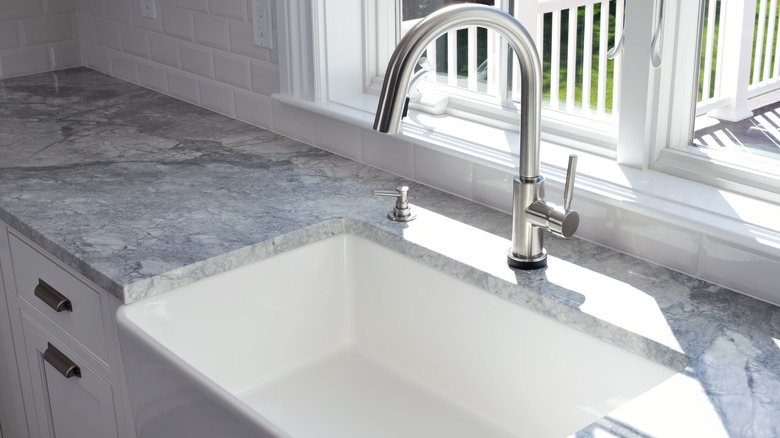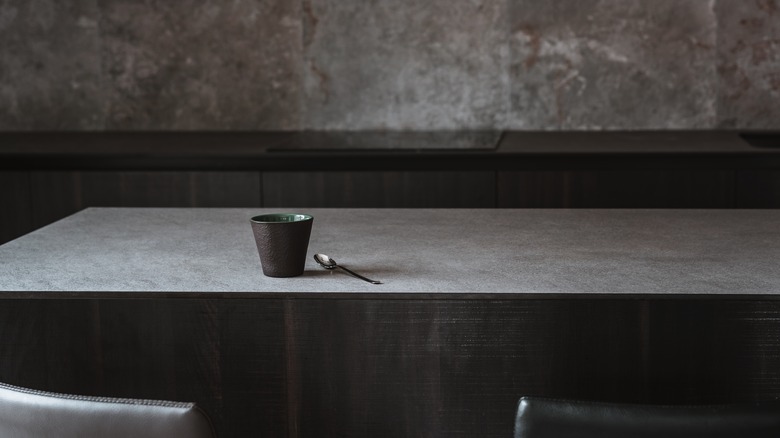Why Homeowners Have Mixed Feelings About Soapstone Countertops
Countertops are one of the most essential details in a kitchen or bathroom. It has to be both functional and beautiful, adding to the aesthetic appeal while holding up to daily use. That's why choosing the right material is an essential albeit overwhelming task. With a variety of options, it can be difficult to know exactly which material is right, and comparing features of each can be confusing. Popular options like marble, granite, and quartz are often considered. However, for those who want something a little different, soapstone countertops may be the final choice.
If you search reviews of soapstone, you'll often find a mixed bag. Some homeowners love it, and others regret adding it to their space. In general, it comes down to how well soapstone holds up over time, and many homeowners are disappointed with its appearance after a couple of years. On the positive side, others love the low-maintenance aspect of soapstone as well as the aesthetic it can bring to a room. Unfortunately, for many homeowners, the scratches and nicks it easily gathers outweigh the beauty of the material. Plus, soapstone is more expensive than common countertop materials like granite, which tends to hold up better over time.
Why some regret soapstone
The biggest complaint when it comes to soapstone has to do with the softness of the stone and how it stands up in high-traffic areas. Compared to granite and marble, soapstone is a much softer material. This, however, does not mean that it's too soft to be a countertop. Soapstone is not soft enough that it will crack easily, but this stone is much more susceptible to scratches than others. Moving an object across the surface can cause scratches, and dropping something on the counters can cause them to nick. For these reasons, soapstone may not be the best choice for busy homes, often-used kitchens or bathrooms, or homes with children.
Mineral oil is a temporary fix to hide scratches. However, if you clean your countertops with simple soap and water, the oil will be removed and the scratch will be revealed again. It also, of course, leaves behind oil that can be felt when touched. Sanding out the scratches is an option, but unfortunately, this doesn't work for every scratch. And, sanding can often cause that area of the counter to lose its shine.
Soapstone also naturally patinas over time. When the stone is first quarried, it's often either a light blue gray or a darker gray. As soapstone ages, it gets darker. Many who love soapstone speed up the aging and patina process with wax or oil. However, if you want the counter to stay the exact color you bought, soapstone is probably not right for your home.
Soapstone isn't all bad
Don't take some homeowners' qualms to mean that soapstone is a bad material to use in your home. While soapstone is a softer material, it is a dense one, which makes it durable. It has comparable durability to other common stones used in kitchens and bathrooms. Another benefit to soapstone is that it doesn't stain, even from acid. The nonporous stone doesn't allow for liquids to seep inside, which prevents bacteria growth and staining.
Soapstone is also recyclable. It's a great option for those looking to make your home more eco-friendly. The recyclable and durable nature of soapstone allows you to find salvaged and second-hand countertops from many suppliers, which may also be a lower-cost option.
The major benefit of soapstone is that it's low maintenance, which means it doesn't require regular sealing or oiling. Porous materials like marble and granite require sealing, often about once a year. Because soapstone is nonporous, yearly sealing isn't necessary. This makes it ideal for busy homeowners or those who don't want to be obsessive over maintenance. If you take care of soapstone, you can expect the stone to last for at least 20 years or even longer.


